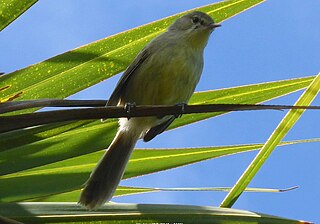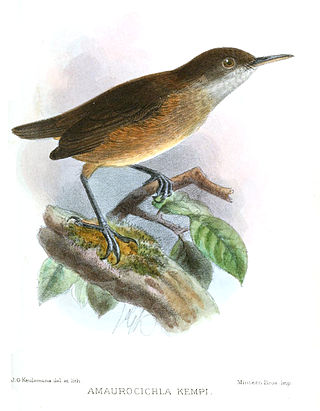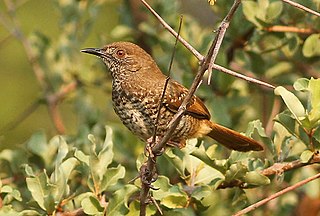Old World warblers are a large group of birds formerly grouped together in the bird family Sylviidae. They are not closely related to the New World warblers. The family held over 400 species in over 70 genera, and were the source of much taxonomic confusion. Two families were split out initially, the cisticolas into Cisticolidae and the kinglets into Regulidae. In the past ten years they have been the subject of much research and many species are now placed into other families, including the Acrocephalidae, Cettiidae, Phylloscopidae, and Megaluridae. In addition some species have been moved into existing families or have not yet had their placement fully resolved. A smaller number of warblers, together with some babblers formerly placed in the family Timaliidae and the parrotbills, are retained in a much smaller family Sylviidae.

The Rodrigues warbler is a species of Old World warbler in the family Acrocephalidae.

The speckled reed warbler or streaked reed warbler is an Old World warbler in the family Acrocephalidae. The species was first described by Robert Swinhoe in 1863.

The Benguet bush warbler, also known as the Benguet grasshopper-warbler, is a songbird species. Formerly placed in the "Old World warbler" assemblage, it is now placed in the newly recognized family Locustellidae. L. seebohmi was formerly known as russet bush warbler, but that name is now restricted to L. mandelli, formerly included in L. seebohmi as a subspecies but now considered a separate species. It is found in the mountains of northern Luzon in the Philippines.

The grey longbill is a species of Old World warbler in the family Macrosphenidae. It is found in Angola, Benin, Cameroon, Central African Republic, Republic of the Congo, Democratic Republic of the Congo, Ivory Coast, Equatorial Guinea, Gabon, Ghana, Guinea, Liberia, Nigeria, Sierra Leone, Tanzania, Togo, and Uganda. Its natural habitat is subtropical or tropical moist lowland forests.

Macrosphenus is a genus of African warblers, formerly placed in the family Sylviidae. It is one of two genera in that family known as longbills.

The yellow longbill is a species of Old World warbler in the family Macrosphenidae. Its natural habitats are subtropical or tropical moist lowland forests and subtropical or tropical moist montane forests.

Kemp's longbill is a species of Old World warbler in the family Macrosphenidae. It is found in Cameroon, Ivory Coast, Ghana, Guinea, Liberia, Nigeria, and Sierra Leone. Its natural habitat is subtropical or tropical moist lowland forests.

Kretschmer's longbill is a species of Old World warbler in the family Macrosphenidae. It is found in Kenya, Mozambique, and Tanzania. Its natural habitats are subtropical or tropical moist lowland forests and subtropical or tropical moist montane forests.

The moustached grass warbler is a species of African warbler, formerly placed in the family Sylviidae.
The Kolombangara leaf warbler or sombre leaf warbler is a species of Old World warbler in the family Phylloscopidae. It is found only in Solomon Islands. Its natural habitat is subtropical or tropical moist montane forests. It is threatened by habitat loss.

The chestnut-crowned warbler is a species of leaf warbler. It was formerly included in the "Old World warbler" assemblage.

The red-capped crombec is a species of African warbler, formerly placed in the family Sylviidae.
The long-billed forest warbler, also known as the long-billed tailorbird, is a songbird of the family Cisticolidae, formerly part of the "Old World warbler" assemblage. It is found in Tanzania and Mozambique. Its natural habitat is subtropical or tropical moist montane forests. It is threatened by habitat destruction.

The three-striped warbler is a species of bird in the family Parulidae. It was previously considered conspecific with the Tacarcuna warbler and the black-eared warbler. This bird is found in South America from Venezuela to Peru. The Yungas warbler was previously considered a subspecies.

The barred wren-warbler or southern barred warbler is a species of bird in the family Cisticolidae.

The Barbuda warbler is a species of bird in the family Parulidae. It is endemic to the island of Barbuda in Antigua and Barbuda. Its natural habitat is tropical dry shrubland near wetland areas. It is threatened by habitat loss. It once was considered a subspecies of the Adelaide's warbler. In September 2017, the warbler's habitat was massively damaged by Hurricane Irma. Despite this, the species was found to have survived the storm and its aftermath, and later surveys have indicated that the species was not significantly affected by the hurricane. However, it is still threatened by unplanned housing development, garbage dumping, and poor land-use practices.

The African warblers are a newly erected family Macrosphenidae, of African songbirds. Most of the species were formerly placed in the Old World warbler family Sylviidae, although one species, the rockrunner, was placed in the babbler family, Timaliidae. A series of molecular studies of the Old World warblers and other bird families in the superfamily Sylvioidea found that the African warblers were not part of Sylviidae but were instead an early (basal) offshoot of the entire clade Sylvioidea. Some taxonomic authorities place the entire family Hyliidae here.
The montane tiny greenbul is a species of songbird in the bulbul family, Pycnonotidae. It is endemic to the Usambara and Nguru Mountains in Tanzania. Its natural habitats are subtropical or tropical moist montane forests and subtropical or tropical moist shrubland.
The West Himalayan bush warbler is a species of Old World warbler in the family Locustellidae. It is found in the northwestern Himalayas.

















